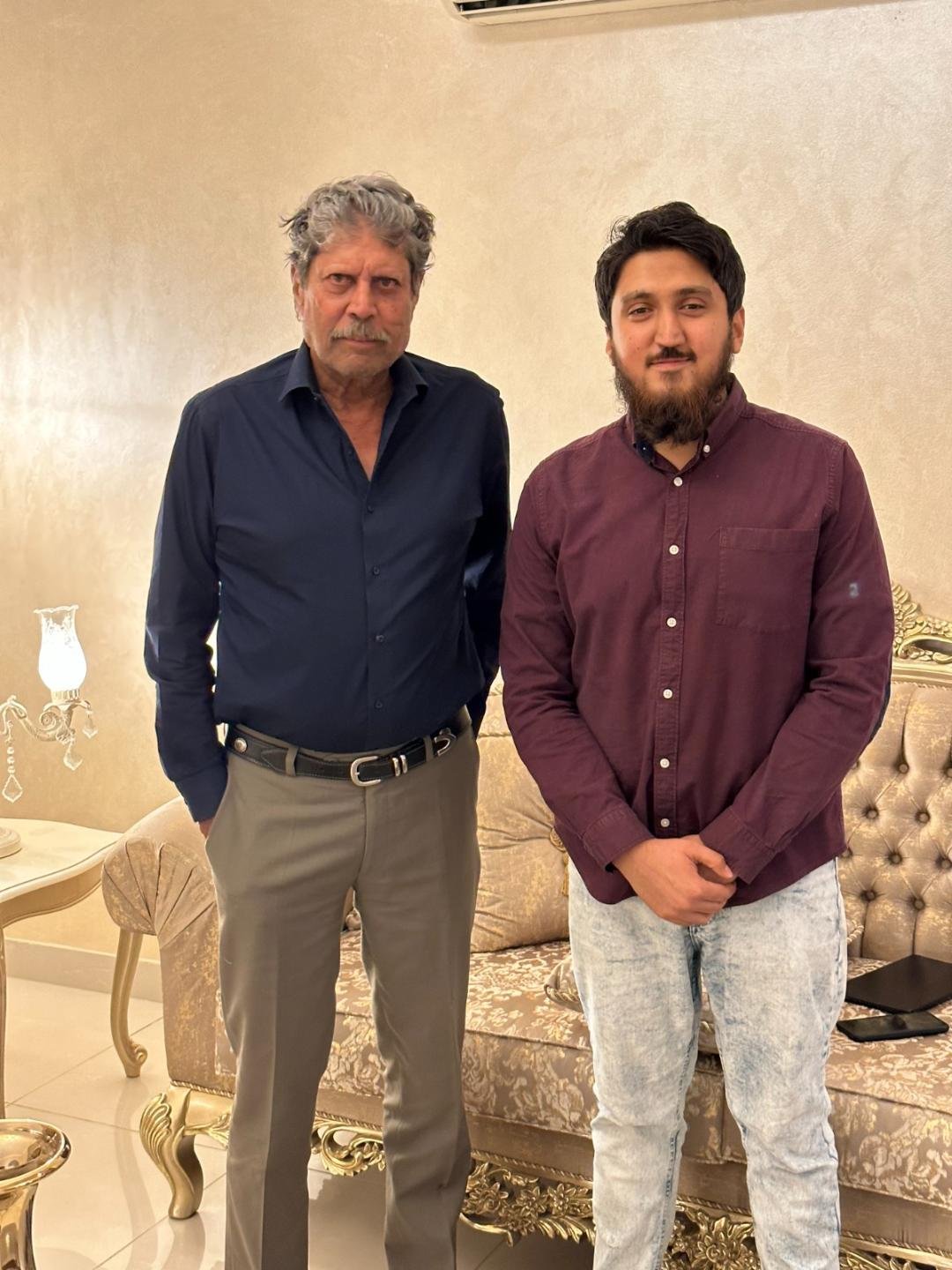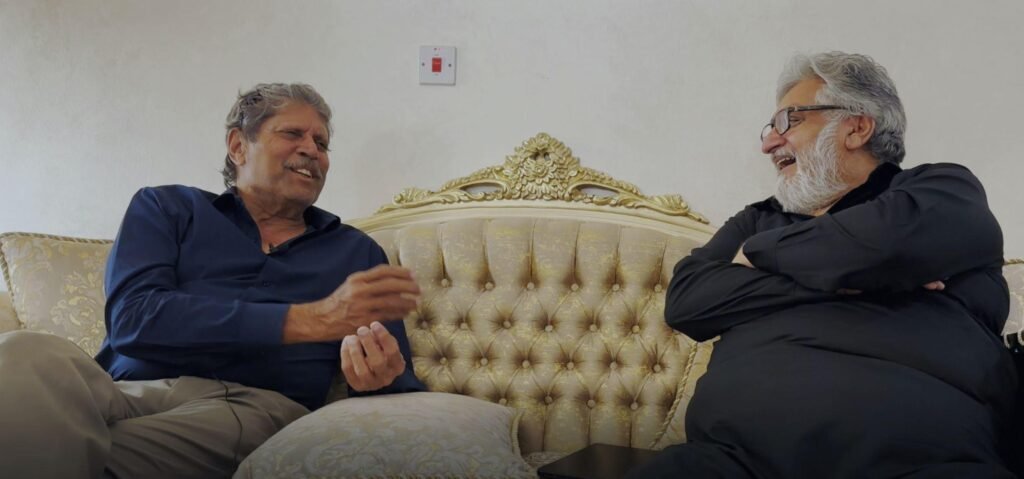Doha, Qatar, 21 June 2023
By Haroon Qureshi
Today is a significant day in my life as a cricket enthusiast, as it marks the meeting with a magnificent star of not just South Asia but the cricketing world, who dazzled on the horizon of cricket for 16 years. The victorious captain of the Indian cricket team in the 1983 World Cup and the first fast-bowling all-rounder, Kapil Dev.
I had the good fortune of meeting the legendary Kapil Dev at the house of my dear friend Fazal Qazi in Qatar. I am fortunate to be among those lucky people who witnessed Kapil Dev playing against Pakistan during his first tour of Pakistan in Lahore.
The flamboyant lad, who excelled in pace bowling, was praised by cricket pundits who said that India had produced a genuine pace-bowling all-rounder for the first time. During that era, the Indian team relied on famous world-class spinners like Bishan Singh Bedi, Erapalli Prasanna, Srinisvas Venkatraghavan, and Bhagwat Chandrasekhar. The inclusion of a pace-bowling all-rounder in this team was a big deal.
Apart from India, in the years 1980-1970, other teams also had fast-bowling greats on the field, including Malcolm Marshall, Andy Roberts, Michael Holding, Dennis Lillee, Jeff Thomson, Richard Hadlee, Ian Botham, Sarfraz Nawaz, Imran Khan, and others. For the first time, Kapil Dev was included in the list of top pace-bowling all-rounders in the world based on his performance. In a short period of time, Kapil Dev began to rival the three best pace-bowling all-rounders in world cricket: Richard Hadlee, Ian Botham, and Imran Khan. Kapil Dev played his first match on October 16, 1978, against Pakistan in Faisalabad, and his last on March 19, 1994, against New Zealand. In his career, he played 131 Test matches, scoring 5,248 runs and taking 434 wickets. He scored 3,783 runs and took 253 wickets in 225 One Day Internationals.
Before meeting Kapil Dev, I had many apprehensions in my heart about how he would react, considering he had given thousands of interviews. But it became evident that great people in the world are not defined by their work alone, but by their character. When our friend Fazal said to Kapil Dev, "Paaji, Haroon has come to interview you," Kapil responded without hesitation, "Come in. Ask whatever you want to ask. I am here." And so, our conversation began, and I learned that Kapil Dev's ancestors hailed from Sahiwal, a town in Pakistan, before they migrated to India after independence from British Colonial empire.
Haroon: Kapil, first tell me about your health. You had a stroke recently.
Kapil: I'm completely fine. You know the media exaggerates everything. There was a lot of noise.
Haroon: It's credited to you that after joining your team, pace bowlers are coming into Indian cricket with discipline.
Kapil: If we look at Indian cricket of the past 20 years and compare it to today's cricket, there has been a significant difference. The style of cricket has changed with time, and there has been a great improvement in the management of Indian cricket. Young talented players are getting more opportunities, and I believe that more skillful players from smaller cities are emerging. They have a little more passion for bowling, and as for batting, most of the talented names come from bigger cities. That's what I think.
Haroon: Has a genuine all-rounder been produced after you?
Kapil: Becoming an all-rounder in cricket requires relentless hard work from the beginning. Moreover, nowadays cricket is played a lot, which prevents some players from fulfilling the required criteria of the game because they get injured from playing too many matches. The weather in the subcontinent is not favourable. There is winter in northern India and Pakistan, while the other regions of India experience extreme heat. To excel in pace bowling, you have to put in twice the effort, so here you get to see more batters because players seek an easier way. I can say that young players are looking for their own heroes. India has produced great batters for many years, and the list is extensive.
Haroon: What is the reason you have played international cricket for 16 years without getting injured, and why today’s cricketers can't seem to play against fast bowlers without injury?
Kapil: I don't want to say that players get injured for no reason, but nowadays cricketers play cricket for ten months or even more. They don't get a chance to rest and their bodies recover. Maybe we didn't have as much pressure during our time. We didn't have too many Test or One-Day International matches, so the pressure was less. After the advent of T20 cricket, the number of matches increased, and the pressure on the players also increased. When there is a lot of money involved, players feel pressure in their eyes and body language. Due to the lack of rest in a player's body, health issues escalate.
Haroon: Don't you think that T20 cricket is changing the way cricket is played worldwide? Do you see it as a threat to Test cricket or its future?
Kapil: See, it depends on the International Cricket Council (ICC) to bring about changes in Test cricket so that people come back to watch Test matches at the grounds as people prefer T20 cricket. Whatever people like ends up gaining popularity. But it is the responsibility of the ICC to introduce certain changes in Test cricket.
T20 and One-Day cricket have done one thing, and that is that the results of matches have started coming in. If you look back a quarter century ago, matches used to end in draws more frequently, but now the pace of the game has changed, and results are coming in more often. The major change is that teams now play for victory even on the fifth day, rather than playing for a draw. Maybe in our time, if you didn't have a hundred percent belief in winning, you would go towards playing for a draw. But the current young generation plays aggressively by nature, which is why they get more results. This is all because of T20 cricket.
Haroon: Do you feel any difference between cricket in your era and cricket in the present era?
Kapil: I believe that today's players can make a life out of cricket, whereas players from our time also had regular jobs alongside playing cricket. They had jobs in railways, airlines, and other departments besides playing cricket. Today's players have become professional cricketers, and when you become a professional player, your thinking changes. Today's players pay more attention to their future.
Haroon: In your time, Lala Amarnath used to be a cricket expert who understood the technique of cricket. Nowadays, a player who couldn't secure a place in their national team in India or Pakistan becomes a cricket expert. What do you say about that?
Kapil: I think it should be limited. If we talk about Pakistan, there are big players like Wasim Akram and Waqar Younis who discuss the game. In India, there are Sunil Gavaskar and Ravi Shastri. Sometimes these players become experts from anchors, which surprises us. Those who have played cricket should answer, but some people believe that anchors understand cricket better.
Haroon: In today's era, the cricketers of IPL earn so much money in one season that some players in your era couldn't earn in their entire lives. In your opinion, what impact has this had on the game of cricket?
Kapil: It hasn't had that much of an impact if you think positively and understand. Even today, I believe that cricketers don't get more money. If the Board get a TV rights deal worth INR 50 crores, the players don't even get one crore. If we look at it from this perspective, the business is huge, but the players are not benefiting much, proportionately speaking. Even if players get a 2% share, it's nothing. When you hear that someone is earning 10 crores from it, they are earning 20 crores, but if we talk about the business side, the person making money is much more. We only talk about how much money the cricketers are making.
In our time, the cricket board didn't have much money, there were no TV rights, so players used to get less compensation. Now a TV rights deal is worth a thousand crores. Money is coming in because of the cricketers. Cricket should have a good relationship between administrators and broadcasting agencies. The media always talks about how players are making a lot of money, but then you see that the cricket board is also making very little. Even the ICC is making very little. It depends on the ICC how they balance and manage cricket. Regarding the question about whether Test cricket is ending, if there is more benefit here, then we should go back to playing One Day and Test matches.
Haroon: After the FIFA World Cup, the Legend's Cup took place in Qatar last month. Qatar Airways has recently sponsored the Bangalore team in the IPL. How do you see the future of cricket in Qatar?
Kapil: I think the future of T20 is very bright because as a cricketer, I want cricket to be played all over the world. Qatar has made a name for itself in sports around the world. Currently, only around 15 countries play cricket, but when America, China, Japan, Europe start playing T20, there will be a transformation in cricket.
Haroon: A film was made on the victory of the 1983 World Cup under your leadership. How do you feel when you see your life's biggest success on the big screen?
Kapil: It feels great to see it after 40 years, taking the cricket we played to the big screen. The new generation doesn't know how things were at that time and how we played. We feel good that something we did is also being seen by future generations.
Haroon: During a match in Pakistan, your ball hit Saleem Malik's head. You said, "It didn't hurt much," and he replied, "No, sir, I'm fine." When the second ball hit his leg, Saleem Malik started feeling a lot of pain and began rubbing his leg. You said, "Your brain is in your leg."
Kapil: Such banter was di rigueur back then. During the 1983 World Cup, when Balwinder Singh Sandhu’s head was struck by a ball OF A West Indian pacer, Sandhu went up to him and said, "Don’t you know the brain of a Sardar is not in his head, but in his knees?" This kind of banter was common place, but we should never consider someone small even in jest. This is what makes you bigger as a human being than others.
Talking to Kapil Dev in detail, I realized that he is not just a great player, but also a great human being, and such legends remain in people's hearts for posterity!














Excellent interview by Haroon. Among the quartet of allrounders in the 1970s and 80s. Imran Khan was the only express fast bowler. Richard Hadlee, Ian Botham, and Kapil were medium pacers. Unlike the last two, Imran and Richard didn't do justice to their batting prowess.Perhaps, because their teams had strong top order batters. Regarding anchors becoming 'expert commentators', I think Haroon refers to people like Harsha Bhogle who has been inflicting verbal diarrhoea on fans for the last 30 years. A club level mediocre cricketer is now expert! In the mid 1990s Harsha was part of a cricket journalists team in which I too played as a fast bowler at Brabourne Stadium. The captain gave him the new ball because Harsha was already a known commentator. His fast bowling was hilarious! The speed of his runup was faster than his deliveries! He has survived among retired Test cricket commentators because of his marketing skills and silly metaphors that have impressed clueless BCCI officials!
This is detailed interview by the editor who has spent his whole life in the field of cricket affairs.
He had contributed a lot for the promotion and uplifting the cricket in Qatar .
He is successful in conducting interview from such is high class living legend of cricket who is worldwide famous and remained superstar.
Regards
Haroon, Nice cession with Respectable Kapil Dev....He is not only a legend in cricketing capacity but a humble and down to earth personality which indeed is a rare feature. I remember his spell against England taking 6 wkts for some what like 16 runs or so....That spell of his was simply unplayable for any standard of batting of all times. Simultaneously, he was best batsman among all the all rounders of his time. As last note, I must appreciate Haroon's multidimensional personality to have conducted this interview and keeping himself engaged with the game in some way or the other. Thanks for remembering myself as Guru. In fact, you are and used to be the wind beneath the wings. This time I am not going to miss the chance of meeting you in person when ever you come to Pakistan. Regards.